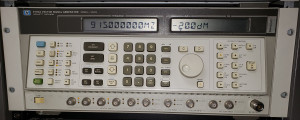8780A Vector Signal Generator
| First Catalog | ? |
|---|---|
| Last Catalog | ? |
| Frequency Range | 10MHz - 3GHz |
The 8780A is an RF signal generator with flexible scalar and vector modulation capabilities. That is, it can perform the standard AM and FM modulation schemes, as well as vector modulation, on the generated RF carrier.
A complete discussion of vector modulation is beyond the scope of HPWiki, and very good references can be found online. In essence it amounts to modulating both the amplitude and phase of a carrier signal simultaneously, such that multiple combinations of discrete states of both amplitude modulation and phase modulation are used to represent symbols for digital communications. In communications theory, a symbol is one portion of data that can be transmitted at one time. In simple modulation schemes, a symbol is equal to one bit, and with eight bits forming a byte. Vector modulation allows multiple bits to be represented by a single symbol and are thus transmitted simultaneously.
An example of a common form of vector modulation is 16-QAM, or 16-state quadrature amplitude modulation. This means that there are four discrete levels of amplitude modulation and four discrete amounts of phase shifting performed on a carrier signal at any instant, for 16 possible combinations. Each symbol in this case represents four bits simultaneously. Complex modulation schemes such as 256-QAM and even 4096-QAM exist today.
The 8780A has separate inputs for I and Q signals (a discussion of which is again beyond the scope of HPWiki), as well as digital inputs. The instrument has an LED next to each BNC input connector indicating which ones are active for the currently-selected modulation scheme.
As a general-purpose signal generator, the 8780A is a fine instrument with impressive specifications and very high build quality that is typical of HP. One needn't use its more advanced modulation capabilities if they aren't needed.

